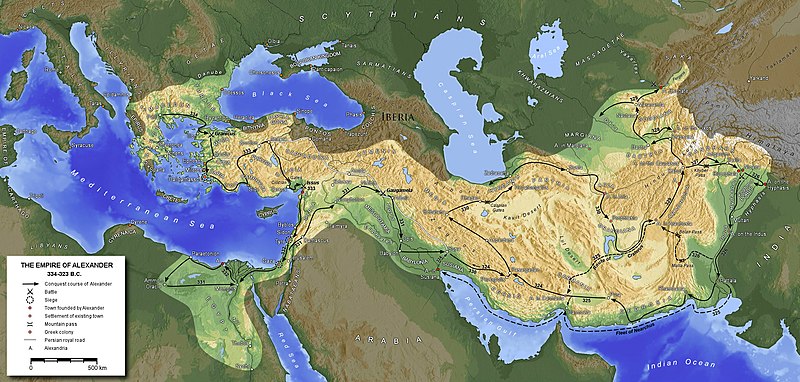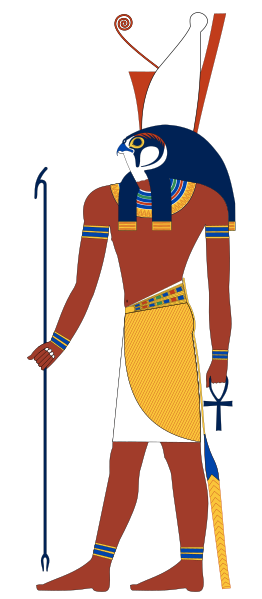It seems the name which the people who created and wrote about the myth of Jesus used for the hero of their tale was a very old one, owing it's origins to an earlier event in human history - the Alexandrian conquest of Northern India.
You may recall from history lessons how Alexander III of Macedon, generally known as Alexander the Great, the son of a minor Macedonian king, Philip II, who conquered Ancient Greece, built the largest empire the world had then known, an empire which was to have a huge and long-lasting influence on the course of history.
 |
| Alexander the Great's Empire |
On his death, a brief civil war resulted in his empire being divided amongst a number of his generals who set themselves up as kings, including Ptolemy, who grabbed Egypt. One of Ptolemy's descendants was Queen Cleopatra, the last Egyptian Pharaoh.
From then on the Eastern Mediterranean area was culturally Greek and Greek became the lingua franca of the Eastern Mediterranean world used for trade, government and increasingly the language scholars and scribes used. Even when Rome succeeded in incorporating much of the Hellenized part of the the world into its expanding empire the language, culture and many of the customs of the eastern half remained Greek, as was that of it's eventual successor in the east, centred on Constantinople (renamed Byzantium, now Istanbul) and calling itself "The Roman Empire" but known to historians as the Byzantine Empire to distinguish the two, until it's demise in 1453.
What has this got to do with the myth of Jesus?
Well, according to D. M. Murdock, the Greeks acquired the name of one of their gods, Zeus, from India in the name 'Dyaus' to which had been appended the Greek for 'the father', 'patêr' to give 'Dyaus Pitar' which became 'Zeus Patêr', from which we get 'Deos', 'Dios', 'Deus', 'Dieu', 'Dei' and 'Theos'. The Romans contracted 'Dyaus Piter' to 'Jupiter', so both Zeus and Jupiter are 'God the Father'
 |
| Horus |
One of Horus' main rivals was Set or Seta, originally another, dark, aspect of Horus with whom Horus once battled for 40 days in the wilderness.
And of course, the Bible's authors wrote their tales about Iesu Christos (Iusa Krst, Jesus Christ), Son of God, who does battle with Seta or Satan, and whose close friend was Peter, names which come to us straight from Alexander's India via Egypt. The fact that Palestine was part of the Hellenized world facilitated the transmission of the stories they wrote in Greek throughout the Eastern Roman Empire, including the major towns of Damascus, Antioch, Alexandria and Constantinople, and to Rome itself, so founding the major branches of early Christianity based on these cities, each with it's own Pope or bishop and each with it's own versions of the tales of this ancient mythical Indian god, set and retold in a Hellenized Palestine and incorporating elements of Ancient Egyptian mythology for added authenticity.
As an interesting aside, again according to D. M. Murdoch, the Hebraic term 'Masiah' (anointed one) was used for any king but it was a title "commonly assumed by imposters, conjurers and pretenders to supernatural communications", so much so that it became a pejorative term to indicate a fraud or imposter, hence its use as a title for Jesus could well have been intended originally to mock an imposter or fraud.


I also read that Abraham got his name from the Hindu creator god, Brahma. But I have no proof of that assertion :/
ReplyDelete